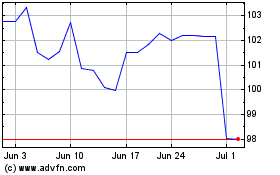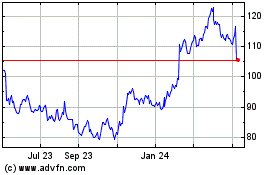Warner Bros. Faces Big Profit Share on Record-Setting 'Joker' Haul
October 26 2019 - 9:49AM
Dow Jones News
By R.T. Watson
Record returns for "Joker" have the movie's backers laughing
their way to the bank, but the studio that made the film, Warner
Bros., could have reaped even bigger profits if it hadn't unloaded
a substantial share of the film to outside investors, according to
people familiar with terms of the film's financing.
On Thursday, the movie became the top-grossing R-rated film of
all time after reaching a total of $788.3 million world-wide,
according to Warner Bros., a unit of AT&T Inc. The previous
record of $782.6 million was held by "Deadpool," released in 2016
by Twentieth Century Fox, now part of Walt Disney Co.
Mixed reviews for "Joker," which stars Joaquin Phoenix, have
failed to deter moviegoers since the film soared to $96.2 million
in the U.S. and Canada during its opening weekend earlier this
month.
During its development, "Joker" was considered by Warner
executives unlikely to generate the same kind of blockbuster
returns as the studio's more conventional DC comic-book movies such
as "Aquaman" and "Wonder Woman," according to one of the people
familiar with the matter. "Joker" is a brooding character-study
considered a "hard" R for its strong language and violence. Further
limiting its commercial prospects, "Joker" was conceived as a
stand-alone film rather than a piece of a larger narrative
structure of sequels, spinoffs and prequels -- a model perfected by
Disney's Marvel Cinematic Universe.
As it turned out, "Joker" has resonated with audiences across
the globe.
"I think 'Joker' worked because people are fascinated with this
character. The source material was great," said Eric Handler, an
analyst at equity research firm MKM Partners. "The film was also
very different from all other movies out right now."
But the film's uniqueness was initially met with skepticism.
Before moving forward, Warner Bros. executives enlisted BRON
Studios and Village Roadshow Pictures as financial partners to help
share the film's risk, with each shouldering between 20% and 25% of
its roughly $60 million production budget, according to another of
the people familiar with the matter. Marketing the film around the
world cost more than $100 million.
The studio previously shared the spoils on the Dark Knight
Batman trilogy with Legendary Pictures, which helped finance the
hit films. After that, Warner Bros. committed to a strategy of
accepting only limited outside financial backing on its most
promising releases, such as its DC Comics and Harry Potter
titles.
Now, the outside backers on "Joker" stand to take home together
between 40% and 50% of the film's profits, the person familiar with
the financing deals said.
The initially iffy financial outlook for "Joker" helped director
Todd Phillips and Mr. Phoenix, the movie's star, secure generous
profit participation deals, according to a another person familiar
with the deal. Such bonus structures are increasingly uncommon on
titles that studios are confident will generate significant
returns.
"Joker" -- which follows the origin story of the most iconic of
Batman villains -- also had to overcome pre-opening concerns over
its plotline, in which a social outcast's violent rise to notoriety
has been interpreted by some critics as similar to the biographies
of real-world mass shooters. Debate arose as to whether the film
might incite off-screen violence, and some theaters beefed up
security to opening-weekend screenings.
Such measures made it more difficult than usual to forecast how
the film would perform, said Comscore senior media analyst Paul
Dergarabedian.
"Joker" hasn't toppled every possible record. "The Passion of
the Christ" -- director Mel Gibson's bloody 2004 depiction of the
Crucifixion -- remains the highest-grossing R-rated film in the
domestic market, with $370.8 million, according to Box Office Mojo,
well ahead of "Joker's" $258.7 million.
(END) Dow Jones Newswires
October 26, 2019 09:34 ET (13:34 GMT)
Copyright (c) 2019 Dow Jones & Company, Inc.
Walt Disney (NYSE:DIS)
Historical Stock Chart
From Mar 2024 to Apr 2024

Walt Disney (NYSE:DIS)
Historical Stock Chart
From Apr 2023 to Apr 2024
